Bill Clinton
Bill Clinton

Clinton's past in Arkansas became the source来源 of accusations 指控,控告and questions about his character as he was running for president. These included questions about financial dealings with a land development company called Whitewater.
克林顿过去在阿肯色州的经历成为他遭受指控的来源,也成为人们质疑他在竞选总统期间所扮演角色的来源。这其中包括他与一个名为“白水”土地开发公司商业交易的一些问题。
In January of 1994, President Clinton asked Attorney General 首席检察官Janet Reno to appoint任命 an independent独立的,独立的律师也不对啊?大概意思应该是任命一位和他们没有利益纠纷的律师吧! lawyer to lead an investigation调查. She named a Republican, but some critics said her choice was too friendly友好的 to the Clinton administration. He was replaced by another Republican, Kenneth Starr.
阿肯色州的首府是小石城,当地的一位前法官也成了故事中的一部分。1994年,大卫﹒黑尔对被控告的欺骗联邦政府这一行为表示服罪。这桩案子与他自己所经营的一家贷款公司有联系,与“白水”土地发展公司没有联系。但黑尔却控告克林顿对他施压,因其向苏珊﹒麦克杜格尔和其他影响政治界的人士贷款。克林顿否认他的这一指控。
外国男性英文名字大全及解析
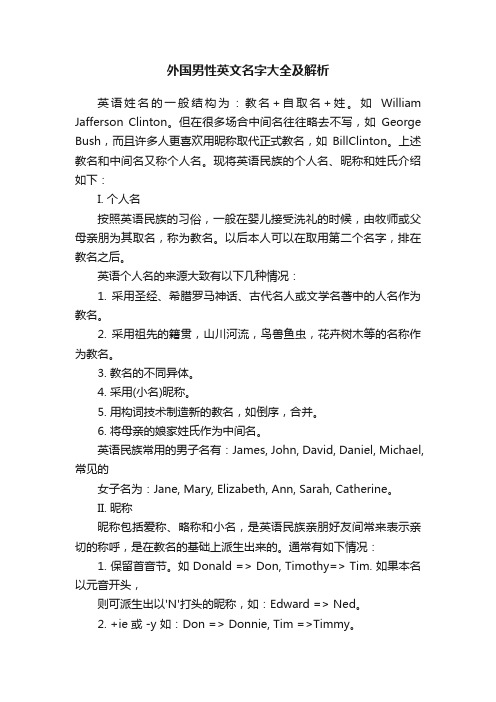
外国男性英文名字大全及解析英语姓名的一般结构为:教名+自取名+姓。
如William Jafferson Clinton。
但在很多场合中间名往往略去不写,如George Bush,而且许多人更喜欢用昵称取代正式教名,如BillClinton。
上述教名和中间名又称个人名。
现将英语民族的个人名、昵称和姓氏介绍如下:I. 个人名按照英语民族的习俗,一般在婴儿接受洗礼的时候,由牧师或父母亲朋为其取名,称为教名。
以后本人可以在取用第二个名字,排在教名之后。
英语个人名的来源大致有以下几种情况:1. 采用圣经、希腊罗马神话、古代名人或文学名著中的人名作为教名。
2. 采用祖先的籍贯,山川河流,鸟兽鱼虫,花卉树木等的名称作为教名。
3. 教名的不同异体。
4. 采用(小名)昵称。
5. 用构词技术制造新的教名,如倒序,合并。
6. 将母亲的娘家姓氏作为中间名。
英语民族常用的男子名有:James, John, David, Daniel, Michael, 常见的女子名为:Jane, Mary, Elizabeth, Ann, Sarah, Catherine。
II. 昵称昵称包括爱称、略称和小名,是英语民族亲朋好友间常来表示亲切的称呼,是在教名的基础上派生出来的。
通常有如下情况:1. 保留首音节。
如 Donald => Don, Timothy=> Tim. 如果本名以元音开头,则可派生出以'N'打头的昵称,如:Edward => Ned。
2. +ie 或 -y 如:Don => Donnie, Tim =>Timmy。
3. 采用尾音节,如:Anthony => Tony, Beuben=> Ben。
4. 由一个教名派生出两个昵称,如:Andrew => Andy &Drew。
5. 不规则派生法,如:William 的一个昵称是 Bill。
III. 姓氏英国人在很长的一段时间里只有名而没有姓。
Bill-Clinton克林顿英文简介

Clinton mainly attended three college schools ❖Georgetown University in Washington ❖University College, Oxford in England ❖Yale Law School in American
---My Life
Bill's marriage proposal: "I bought that house you like, so you better marry me because I can't live in it by myself.“
October 11, 1975
Political career
❖ Graduating from Yale Law School ❖ Became a law professor at the University
of Arkansas. ❖ Ran for the House of Representatives in
1974. ❖ Elected Arkansas Attorney General in
1976. ❖ Elected Governor of Arkansas in 1978.
❖ At the very end of his presidency, Clinton moved to New York and helped his wife win election to the U.S. Senate there.
Clinton and Hillary
They went through the long and tough political life hand in hand, face all the difficulties together. Today, they are still one of the most brilliant couples in the world.
Bill Clinton 翻译习作
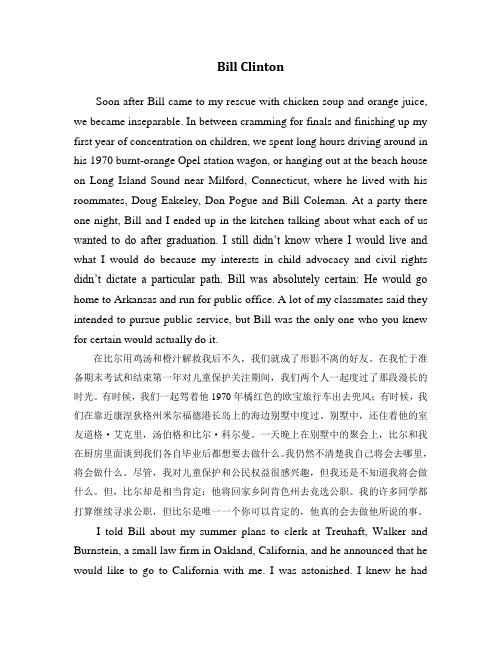
Bill ClintonSoon after Bill came to my rescue with chicken soup and orange juice, we became inseparable. In between cramming for finals and finishing up my first year of concentration on children, we spent long hours driving around in his 1970 burnt-orange Opel station wagon, or hanging out at the beach house on Long Island Sound near Milford, Connecticut, where he lived with his roommates, Doug Eakeley, Don Pogue and Bill Coleman. At a party there one night, Bill and I ended up in the kitchen talking about what each of us wanted to do after graduation. I still didn’t know where I would live and what I would do because my interests in child advocacy and civil rights didn’t dictate a particular path. Bill was absolutely certain: He would go home to Arkansas and run for public office. A lot of my classmates said they intended to pursue public service, but Bill was the only one who you knew for certain would actually do it.在比尔用鸡汤和橙汁解救我后不久,我们就成了形影不离的好友。
Bill-Clinton克林顿英文简介

• The first sight in the class
of Political and Civil Rights
“She had a thick dark blond hair and wore eyeglasses and no makeup, but she conveyed a sense of strength and selfpossession I had rarely seen in anyone, man or woman.”
---My Life
Bill's marriage proposal: "I bought that house you like, so you better marry me because I can't live in it by myself.“
October 11, 1975
Political career
Graduating from Yale Law School Became a law professor at the University
of Arkansas. Ran for the House of Representatives in
1974. Elected Arkansas Attorney General in
“ Sometime in my sixteenth year, I decided I wanted to be in public life as an elected official. I loved music and thought I could be very good, but I knew I would never be John Coltrane orStan Getz. I was interested in medicine and thought I could be a fine doctor, but I knew I would never be Michael DeBakey. But I knew I could be great in public service.”
研究生英语阅读教程(提高级 第三版)课后翻译答案(单独整理的)
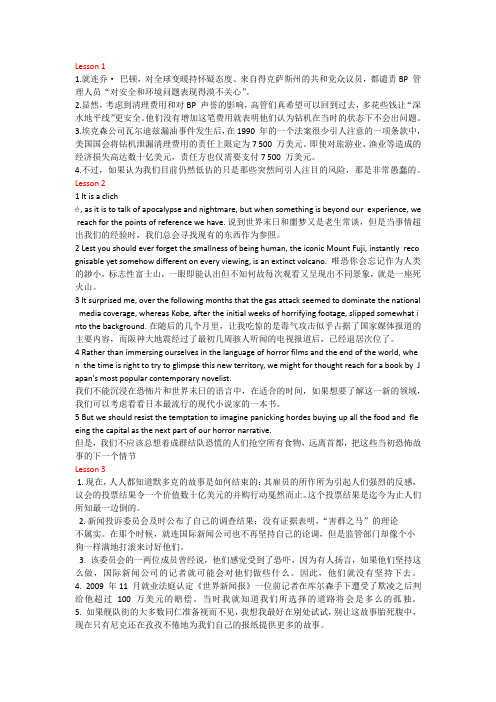
Lesson 11.就连乔·巴顿,对全球变暖持怀疑态度、来自得克萨斯州的共和党众议员,都谴责BP 管理人员“对安全和环境问题表现得漠不关心”。
2.显然,考虑到清理费用和对BP 声誉的影响,高管们真希望可以回到过去,多花些钱让“深水地平线”更安全。
他们没有增加这笔费用就表明他们认为钻机在当时的状态下不会出问题。
3.埃克森公司瓦尔迪兹漏油事件发生后,在1990 年的一个法案很少引人注意的一项条款中,美国国会将钻机泄漏清理费用的责任上限定为7 500 万美元。
即使对旅游业、渔业等造成的经济损失高达数十亿美元,责任方也仅需要支付7 500 万美元。
4.不过,如果认为我们目前仍然低估的只是那些突然间引人注目的风险,那是非常愚蠢的。
Lesson21It is a cliché,as it is to talk of apocalypse and nightmare,but when something is beyond our experience,we reach for the points of reference we have.说到世界末日和噩梦又是老生常谈,但是当事情超出我们的经验时,我们总会寻找现有的东西作为参照。
2Lest you should ever forget the smallness of being human,the iconic Mount Fuji,instantly reco gnisable yet somehow different on every viewing,is an extinct volcano.唯恐你会忘记作为人类的渺小,标志性富士山,一眼即能认出但不知何故每次观看又呈现出不同景象,就是一座死火山。
3It surprised me,over the following months that the gas attack seemed to dominate the national media coverage,whereas Kobe,after the initial weeks of horrifying footage,slipped somewhat i nto the background.在随后的几个月里,让我吃惊的是毒气攻击似乎占据了国家媒体报道的主要内容,而阪神大地震经过了最初几周骇人听闻的电视报道后,已经退居次位了。
克林顿的演说:一个拥抱的力量
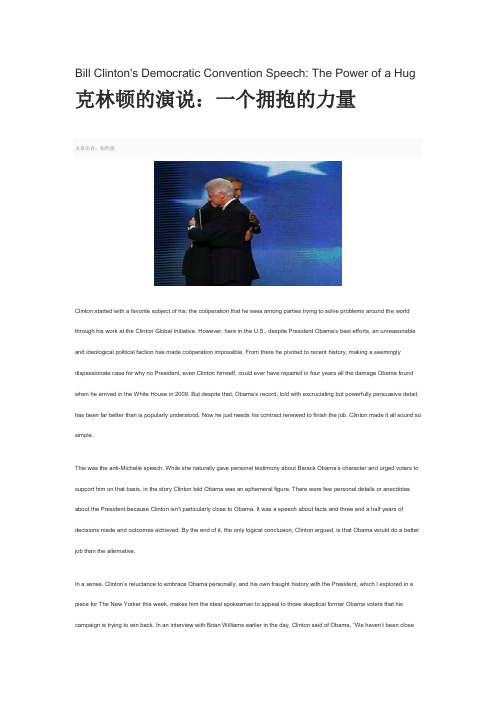
Bill Clinton's Democratic Convention Speech: The Power of a Hug 克林顿的演说:一个拥抱的力量文章出自:纽约客Clinton started with a favorite subject of his: the coöperation that he sees among parties trying to solve problems around the world through his work at the Clinton Global Initiative. However, here in the U.S., despite President Obama’s best effo rts, an unreasonable and ideological political faction has made coöperation impossible. From there he pivoted to recent history, making a seemingly dispassionate case for why no President, even Clinton himself, could ever have repaired in four years all the damage Obama found when he arrived in the White House in 2009. But despite that, Obama’s record, told with excruciating but powerfully persuasiv e detail, has been far better than is popularly understood. Now he just needs his contract renewed to finish the job. Clinton made it all sound so simple.This was the anti-Michelle speech. While she naturally gave personal testimony about Barack Obama’s character and urged voters to support him on that basis, in the story Clinton told Obama was an ephemeral figure. There were few personal details or anecdotes about the President because Clinton isn’t particularly close to Obama. It was a speech about facts and three and a half years of decisions made and outcomes achieved. By the end of it, the only logical conclusion, Clinton argued, is that Obama would do a better job than the alternative.In a sense, Clinton’s reluctance to embrace Obama personally, and his own fraught history with the President, which I explore d in a piece for The New Yorker this week, makes him the ideal spokesman to appeal to those skeptical former Obama voters that his campaign is trying to win back. In an interview with Brian Williams earlier in the day, Clinton said of Obama, “We haven’t be en closefriends a long time or anything like tha t, but he knows that I support him.” I found it an amazingly honest statement considering that politicians often go out of their way to exaggerate their fondness for one another.And it was exactly their lack of personal chemistry and failure to become “close friends” that gave Clinton’s speech its lift. A subtext of the address was that, just like Bill Clinton, wavering voters need not love Obama to understand that he’s a better choice tha n Romney. When the two Presidents came together and hugged after the speech was (finally) over, the distance between them made their embrace all the more powerful.For more of The New Yorker’s convention coverage, visit The Political Scene. You can also read Ryan Lizza on Julián Castro’s keynote address and the relations hip between President Obama and Bill Clinton; John Cassidy on Michelle Obama’s convention speech and Obama’s and Paul Ryan’s false statements about the economy; Amy Davidson on what Bill Clinton didn’t say; the First Lady’s sp eech, the gay-rights platform, and whether Democrats are better off than they were four years ago; Hendrik Hertzberg on renewed Democratic enthusiasm; and Alex Koppelman on Obama and the American Dream.Photograph by Alex Wong/Getty Images.克林顿的演说:一个拥抱的力量克林顿的口才无语伦比,其演说才能也极具天赋,看看在前几天的民主党全国大会的演讲上,他会带给我们什么呢?克林顿的演说:一个拥抱的力量作者:Ryan Lizza我认为,无论从哪方面来讲,在几天前晚上的民主党全国大会上,相比朱利安•卡斯特罗可谓弱暴了的表现,克林顿的演说堪称完美。
President
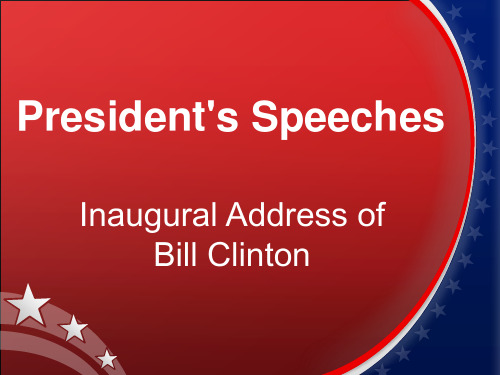
Inaugural Address of Bill Clinton
Contents
• • • •
Introduction about Bill Clinton About the Hillary Clinton About the Inaugural Address The Allegations of the Speech
• Inaugural Address not only stand for the platforms,but also display the personality of the president. It shows the aspiration courage and insight ,daring and resolution of the president.
• What do you think about Bill Clinton ?
Bill Clinton
• Born and raised in Arkansas, Clinton became both a student leader and a skilled musician. He is an alumnus of Georgetown University where he was Phi Beta Kappa and earned a Rhodes Scholarship to attend the University of Oxford.
Bill Clinton
Later, he was impeached for perjury and obstruction of justice in a scandal involving a White House intern, but was acquitted by the U.S. Senate and served his complete term of office. The Congressional Budget Office reported a budget surplus between the years 1998 and 2000, the last three years of Clinton's presidency.
Bill Clinton's Farewell Address 克林顿告别演说(中英文)
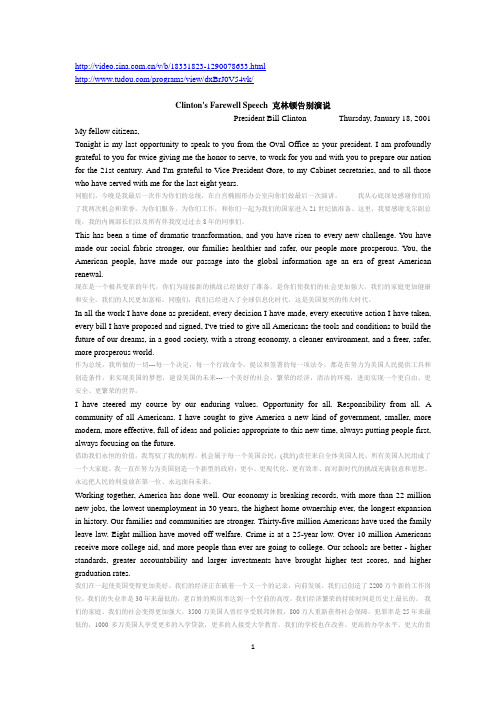
/v/b/18331823-1290078633.html/programs/view/dxBrJ0V54vk/Clinton's Farewell Speech 克林顿告别演说President Bill Clinton Thursday, January 18, 2001 My fellow citizens,Tonight is my last opportunity to speak to you from the Oval Office as your president. I am profoundly grateful to you for twice giving me the honor to serve, to work for you and with you to prepare our nation for the 21st century. And I'm grateful to Vice President Gore, to my Cabinet secretaries, and to all those who have served with me for the last eight years.同胞们,今晚是我最后一次作为你们的总统,在白宫椭圆形办公室向你们做最后一次演讲。
我从心底深处感谢你们给了我两次机会和荣誉,为你们服务,为你们工作,和你们一起为我们的国家进入21世纪做准备。
这里,我要感谢戈尔副总统,我的内阁部长们以及所有伴我度过过去8年的同事们。
This has been a time of dramatic transformation, and you have risen to every new challenge. You have made our social fabric stronger, our families healthier and safer, our people more prosperous. You, the American people, have made our passage into the global information age an era of great American renewal.现在是一个极具变革的年代,你们为迎接新的挑战已经做好了准备。
Bill Clinton
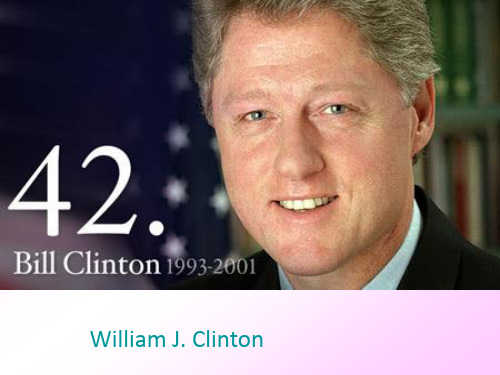
Clinton awarded the "Times" Person of the Year in 1992
Clinton and Starr 1996 named Time “Man of the Year
During the administration of William Jefferson Clinton, the U.S. enjoyed more peace and economic well being than at any time in its history. He was the first Democratic president since Franklin D. Roosevelt to win a second term. He could point to the lowest unemployment rate in modern times, the lowest inflation in 30 years, the highest home ownership in the country's history, dropping crime rates in many places, and reduced welfare rolls. He proposed the first balanced budget in decades and achieved a budget surplus. As part of a plan to celebrate the millennium in 2000, Clinton called for a great national initiative to end racial discrimination.
克林顿的生平简介

•
Clinton was the first President since Franklin Roosevelt was reelected(连任) democratic President. • In the Clinton political career, he had a lot of scandals(丑闻), therefore,Clinton was one of the controversial(有争议的) figure of the American presidents.Inspite of this, Clinton still has a high popularity. the main reason Clinton has been this is some achievements, especially during his office he created America's longterm economic prosperity, and makes USA becone a country which owns development of hightech industry , the position of today's American superpower.(超 级大国)
William Jefferson "Bill" Clinton (born on August 19, 1946) is an American politician(政治家) who served from 1993 to 2001 as the 42nd President of the United States. Inaugurated(任职) at age 46, He took office(就 任) at the end of the Cold War. Clinton has been described as a New Democrat(新民主党员). Many of his policies(政 策) have been attributed to(归于) a centrist (中 间派议员)。
克林顿自传My Life 1 of 6 Bill Clinton

克林顿有声自传My Life 1 of 6 Bill ClintonWhen I was a young man just out of law school and eager to get on with my life, on a whim I briefly put aside my reading preference for fiction and history and bought one of those how-to books: How to Get Control of Your Time and Your Life, by Alan Lakein. The book's main point was the necessity of listing short-, medium-, and long-term life goals, then categorizing them in order of their importance, with the A group being the most important, the B group next, and the C the last, then listing under each goal specific activities designed to achieve them. I still have that paperback book, now almost thirty years old. And I'm sure I have that old list somewhere buried in my papers, though I can't find it. However, I do remember the A list. I wanted to be a good man, have a good marriage and children, have good friends, make a successful political life, and write a great book.Whether I'm a good man is, of course, for God to judge. I know that I am not as good as my strongest supporters believe or as I hope to become, nor as bad as my harshest critics assert. I have been graced beyond measure by my family life with Hillary and Chelsea. Like all families' lives, ours is not perfect, but it has been wonderful. Its flaws, as all the world knows, are mostly mine, and its continuing promise is grounded in their love. No person I know ever had more or better friends. Indeed, a strong case can be made that I rose to the presidency on the shoulders of my personal friends, the now legendary FOBs.My life in politics was a joy. I loved campaigns and I loved governing. I always tried to keep things moving in the right direction, to give more people a chance to live their dreams, to lift people's spirits, and to bring them together. That's the way I kept score.As for the great book, who knows? It sure is a good story.ONEEarly on the morning of August 19, 1946, I was born under a clear sky after a violent summer storm to a widowed mother in the Julia Chester Hospital in Hope, a town of about six thousand in southwest Arkansas, thirty-three miles east of the Texas border at Texarkana. My mother named me William Jefferson Blythe III after my father, William Jefferson Blythe Jr., one of nine children of a poor farmer in Sherman, Texas, who died when my father was seventeen. According to his sisters, my father always tried to take care of them, and he grew up to be a handsome, hardworking, fun-loving man. He met my mother at Tri-State Hospital in Shreveport, Louisiana, in 1943, whenshe was training to be a nurse. Many times when I was growing up, I asked Mother to tell me the story of their meeting, courting, and marriage. He brought a date with some kind of medical emergency into the ward where she was working, and they talked and flirted while the other woman was being treated. On his way out of the hospital, he touched the finger on which she was wearing her boyfriend's ring and asked her if she was married. She stammered "no"--she was single. The next day he sent the other woman flowers and her heart sank. Then he called Mother for a date, explaining that he always sent flowers when he ended a relationship.Two months later, they were married and he was off to war. He served in a motor pool in the invasion of Italy, repairing jeeps and tanks. After the war, he returned to Hope for Mother and they moved to Chicago, where he got back his old job as a salesman for the Manbee Equipment Company. They bought a little house in the suburb of Forest Park but couldn't move in for a couple of months, and since Mother was pregnant with me, they decided she should go home to Hope until they could get into the new house. On May 17, 1946, after moving their furniture into their new home, my father was driving from Chicago to Hope to fetch his wife. Late at night on Highway 60 outside of Sikeston, Missouri, he lost control of his car, a 1942 Buick, when the right front tire blew out on a wet road. He was thrown clear of the car but landed in, or crawled into, a drainage ditch dug to reclaim swampland. The ditch held three feet of water. When he was found, after a two-hour search, his hand was grasping a branch above the waterline. He had tried but failed to pull himself out. He drowned, only twenty-eight years old, married two years and eight months, only seven months of which he had spent with Mother.That brief sketch is about all I ever really knew about my father. All my life I have been hungry to fill in the blanks, clinging eagerly to every photo or story or scrap of paper that would tell me more of the man who gave me life.When I was about twelve, sitting on my uncle Buddy's porch in Hope, a man walked up the steps, looked at me, and said, "You're Bill Blythe's son. You look just like him."I beamed for days.In 1974, I was running for Congress. It was my first race and the local paper did a feature story on my mother. She was at her regular coffee shop early in the morning discussing the article with a lawyer friend when one of the breakfast regulars she knew only casually came up to her and said, "I was there, I was the first one at the wreck that night." He then told Mother what he had seen, including the fact that myfather had retained enough consciousness or survival instinct to try to claw himself up and out of the water before he died. Mother thanked him, went out to her car and cried, then dried her tears and went to work.In 1993, on Father's Day, my first as President, the Washington Post ran a long investigative story on my father, which was followed over the next two months by other investigative pieces by the Associated Press and many smaller papers. The stories confirmed the things my mother and I knew. They also turned up a lot we didn't know, including the fact that my father had probably been married three times before he met Mother, and apparently had at least two more children.My father's other son was identified as Leon Ritzenthaler, a retired owner of a janitorial service, from northern California. In the article, he said he had written me during the '92 campaign but had received no reply. I don't remember hearing about his letter, and considering all the other bullets we were dodging then, it's possible that my staff kept it from me. Or maybe the letter was just misplaced in the mountains of mail we were receiving. Anyway, when I read about Leon, I got in touch with him and later met him and his wife, Judy, during one of my stops in northern California. We had a happy visit and since then we've corresponded in holiday seasons. He and I look alike, his birth certificate says his father was mine, and I wish I'd known about him a long time ago.Somewhere around this time, I also received information confirming news stories about a daughter, Sharon Pettijohn, born Sharon Lee Blythe in Kansas City in 1941, to a woman my father later divorced. She sent copies of her birth certificate, her parents' marriage license, a photo of my father, and a letter to her mother from my father asking about "our baby" to Betsey Wright, my former chief of staff in the governor's office. I'm sorry to say that, for whatever reason, I've never met her.This news breaking in 1993 came as a shock to Mother, who by then had been battling cancer for some time, but she took it all in stride. She said young people did a lot of things during the Depression and the war that people in another time might disapprove of. What mattered was that my father was the love of her life and she had no doubt of his love for her. Whatever the facts, that's all she needed to know as her own life moved toward its end. As for me, I wasn't quite sure what to make of it all, but given the life I've led, I could hardly be surprised that my father was more complicated than the idealized pictures I had lived with for nearly half a century.In 1994, as we headed for the celebration of the fiftieth anniversary of D-day, several newspapers published a story on my father's war record, with a snapshot of him in uniform. Shortly afterward, I received a letter from Umberto Baron of Netcong, New Jersey, recounting his own experiences during the war and after. He said that he was a young boy in Italy when the Americans arrived, and that he loved to go to their camp, where one soldier in particular befriended him, giving him candy and showing him how engines worked and how to repair them. He knew him only as Bill. After the war, Baron came to the United States, and, inspired by what he had learned from the soldier who called him "Little GI Joe," he opened his own garage and started a family. He told me he had lived the American dream, with a thriving business and three children. He said he owed so much of his success in life to that young soldier, but hadn't had the opportunity to say good-bye then, and had often wondered what had happened to him. Then, he said, "On Memorial Day of this year, I was thumbing through a copy of the New York Daily News with my morning coffee when suddenly I felt as if I was struck by lightning. There in the lower left-hand corner of the paper was a photo of Bill. I felt chills to learn that Bill was none other than the father of the President of the United States."In 1996, the children of one of my father's sisters came for the first time to our annual family Christmas party at the White House and brought me a gift: the condolence letter my aunt had received from her congressman, the great Sam Rayburn, after my father died. It's just a short form letter and appears to have been signed with the autopen of the day, but I hugged that letter with all the glee of a six-year-old boy getting his first train set from Santa Claus. I hung it in my private office on the second floor of the White House, and looked at it every night.Shortly after I left the White House, I was boarding the USAir shuttle in Washington for New York when an airline employee stopped me to say that his stepfather had just told him he had served in the war with my father and had liked him very much. I asked for the old vet's phone number and address, and the man said he didn't have it but would get it to me. I'm still waiting, hoping there will be one more human connection to my father.At the end of my presidency, I picked a few special places to say goodbye and thanks to the American people. One of them was Chicago, where Hillary was born; where I all but clinched the Democratic nomination on St. Patrick's Day 1992; where many of my most ardent supporters live and many of my most important domestic initiatives in crime, welfare, and education were proved effective; and, of course, where my parentswent to live after the war. I used to joke with Hillary that if my father hadn't lost his life on that rainy Missouri highway, I would have grown up a few miles from her and we probably never would have met. My last event was in the Palmer House Hotel, scene of the only photo I have of my parents together, taken just before Mother came back to Hope in 1946. After the speech and the good-byes, I went into a small room where I met a woman, Mary Etta Rees, and her two daughters. She told me she had grown up and gone to high school with my mother, then had gone north to Indiana to work in a war industry, married, stayed, and raised her children. Then she gave me another precious gift: the letter my twenty-three-year-old mother had written on her birthday to her friend, three weeks after my father's death, more than fifty-four years earlier. It was vintage Mother. In her beautiful hand, she wrote of her heartbreak and her determination to carry on: "It seemed almost unbelievable at the time but you see I am six months pregnant and the thought of our baby keeps me going and really gives me the whole world before me."My mother left me the wedding ring she gave my father, a few moving stories, and the sure knowledge that she was loving me for him too.My father left me with the feeling that I had to live for two people, and that if I did it well enough, somehow I could make up for the life he should have had. And his memory infused me, at a younger age than most, with a sense of my own mortality. The knowledge that I, too, could die young drove me both to try to drain the most out of every moment of life and to get on with the next big challenge. Even when I wasn't sure where I was going, I was always in a hurry.TWOI was born on my grandfather's birthday, a couple of weeks early, weighing in at a respectable six pounds eight ounces, on a twenty-one-inch frame. Mother and I came home to her parents' house on Hervey Street in Hope, where I would spend the next four years. That old house seemed massive and mysterious to me then and still holds deep memories today. The people of Hope raised the funds to restore it and fill it with old pictures, memorabilia, and period furniture. They call it the Clinton Birthplace. It certainly is the place I associate with awakening to life--to the smells of country food; to buttermilk churns, ice-cream makers, washboards, and clotheslines; to my "Dick and Jane" readers, my first toys, including a simple length of chain I prized above them all; to strange voices talking over our "party line" telephone; to my first friends, and the work my grandparents did.After a year or so, my mother decided she needed to go back to New Orleans to Charity Hospital, where she had done part of her nursing training, to learn to be a nurse anesthetist. In the old days, doctors had administered their own anesthetics, so there was a demand for this relatively new work, which would bring more prestige to her and more money for us. But it must have been hard on her, leaving me. On the other hand, New Orleans was an amazing place after the war, full of young people, Dixieland music, and over-the-top haunts like the Club My-Oh-My, where men in drag danced and sang as lovely ladies. I guess it wasn't a bad place for a beautiful young widow to move beyond her loss.I got to visit Mother twice when my grandmother took me on the train to New Orleans.I was only three, but I remember two things clearly. First, we stayed just across Canal Street from the French Quarter in the Jung Hotel, on one of the higher floors. It was the first building more than two stories high I had ever been in, in the first real city I had ever seen. I can remember the awe I felt looking out over all the city lights at night. I don't recall what Mother and I did in New Orleans, but I'll never forget what happened one of the times I got on the train to leave. As we pulled away from thestation, Mother knelt by the side of the railroad tracks and cried as she waved good-bye. I can see her there still, crying on her knees, as if it were yesterday.For more than fifty years, from that first trip, New Orleans has always had a special fascination for me. I love its music, food, people, and spirit. When I was fifteen, my family took a vacation to New Orleans and the Gulf Coast, and I got to hear Al Hirt, the great trumpeter, in his own club. At first they wouldn't let me in because I was underage. As Mother and I were about to walk away, the doorman told us that Hirt was sitting in his car reading just around the corner, and that only he could let me in. I found him--in his Bentley no less--tapped on the window, and made my case. He got out, took Mother and me into the club, and put us at a table near the front. He and his group played a great set--it was my first live jazz experience. Al Hirt died while I was President. I wrote his wife and told her the story, expressing my gratitude for a big man's long-ago kindness to a boy.When I was in high school, I played the tenor saxophone solo on a piece about New Orleans called Crescent City Suite. I always thought I did a better job on it because I played it with memories of my first sight of the city. When I was twenty-one, I won a Rhodes scholarship in New Orleans. I think I did well in the interview in part becauseI felt at home there. When I was a young law professor, Hillary and I had a couple of great trips to New Orleans for conventions, staying at a quaint little hotel in the French Quarter, the Cornstalk. When I was governor of Arkansas, we played in the Sugar Bowl there, losing to Alabama in one of the legendary Bear Bryant's last great victories. At least he was born and grew up in Arkansas! When I ran for President, the people of New Orleans twice gave me overwhelming victory margins, assuring Louisiana's electoral votes for our side.Now I have seen most of the world's great cities, but New Orleans will always be special--for coffee and beignets at the Morning Call on the Mississippi; for the music of Aaron and Charmaine Neville, the old guys at Preservation Hall, and the memory of Al Hirt; for jogging through the French Quarter in the early morning; for amazing meals at a host of terrific restaurants with John Breaux, Sheriff Harry Lee, and my other pals; and most of all, for those first memories of my mother. They are the magnets that keep pulling me down the Mississippi to New Orleans.While Mother was in New Orleans, I was in the care of my grandparents. They were incredibly conscientious about me. They loved me very much; sadly, much better than they were able to love each other or, in my grandmother's case, to love my mother. Of course, I was blissfully unaware of all this at the time. I just knew that I was loved. Later, when I became interested in children growing up in hard circumstances and learned something of child development from Hillary's work at the Yale Child Study Center, I came to realize how fortunate I had been. For all their own demons, my grandparents and my mother always made me feel I was the most important person in the world to them. Most children will make it if they have just one person who makes them feel that way. I had three.My grandmother, Edith Grisham Cassidy, stood just over five feet tall and weighed about 180 pounds. Mammaw was bright, intense, and aggressive, and had obviously been pretty once. She had a great laugh, but she also was full of anger and disappointment and obsessions she only dimly understood. She took it all out in raging tirades against my grandfather and my mother, both before and after I was born, though I was shielded from most of them. She had been a good student and ambitious, so after high school she took a correspondence course in nursing from the Chicago School of Nursing. By the time I was a toddler she was a private-duty nurse for a man not far from our house on Hervey Street. I can still remember running down the sidewalk to meet her when she came home from work.Mammaw's main goals for me were that I would eat a lot, learn a lot, and always be neat and clean. We ate in the kitchen at a table next to the window. My high chair faced the window, and Mammaw tacked playing cards up on the wooden window frame at mealtimes so that I could learn to count. She also stuffed me at every meal, because conventional wisdom at the time was that a fat baby was a healthy one, as long as he bathed every day. At least once a day, she read to me from "Dick and Jane" books until I could read them myself, and from World Book Encyclopedia volumes, which in those days were sold door-to-door by salesmen and were often the only books besides the Bible in working people's houses. These early instructions probably explain why I now read a lot, love card games, battle my weight, and never forget to wash my hands and brush my teeth.I adored my grandfather, the first male influence in my life, and felt pride that I was born on his birthday. James Eldridge Cassidy was a slight man, about five eight, but in those years still strong and handsome. I always thought he resembled the actor Randolph Scott.When my grandparents moved from Bodcaw, which had a population of about a hundred, to the metropolis Hope, Papaw worked for an icehouse delivering ice on a horse-drawn wagon. In those days, refrigerators really were iceboxes, cooled by chunks of ice whose size varied according to the size of the appliance. Though he weighed about 150 pounds, my grandfather carried ice blocks that weighed up to a hundred pounds or more, using a pair of hooks to slide them onto his back, which was protected by a large leather flap.My grandfather was an incredibly kind and generous man. During the Depression, when nobody had any money, he would invite boys to ride the ice truck with him just to get them off the street. They earned twenty-five cents a day. In 1976, when I was in Hope running for attorney general, I had a talk with one of those boys, Judge John Wilson. He grew up to be a distinguished, successful lawyer, but he still had vivid memories of those days. He told me that at the end of one day, when my grandfather gave him his quarter, he asked if he could have two dimes and a nickel so that he could feel he had more money. He got them and walked home, jingling the change in his pockets. But he jingled too hard, and one of the dimes fell out. He looked for that dime for hours to no avail. Forty years later, he told me he still never walked by that stretch of sidewalk without trying to spot that dime.It's hard to convey to young people today the impact the Depression had on myparents' and grandparents' generation, but I grew up feeling it. One of the most memorable stories of my childhood was my mother's tale of a Depression Good Friday when my grandfather came home from work and broke down and cried as he told her he just couldn't afford the dollar or so it would cost to buy her a new Easter dress. She never forgot it, and every year of my childhood I had a new Easter outfit whether I wanted it or not. I remember one Easter in the 1950s, when I was fat and self-conscious. I went to church in a light-colored short-sleeved shirt, white linen pants, pink and black Hush Puppies, and a matching pink suede belt. It hurt, but my mother had been faithful to her father's Easter ritual.When I was living with him, my grandfather had two jobs that I really loved: he ran a little grocery store, and he supplemented his income by working as a night watchman at a sawmill. I loved spending the night with Papaw at the sawmill. We would take a paper bag with sandwiches for supper, and I would sleep in the backseat of the car. And on clear starlit nights, I would climb in the sawdust piles, taking in the magical smells of fresh-cut timber and sawdust. My grandfather loved working there, too. It got him out of the house and reminded him of the mill work he'd done as a young man around the time of my mother's birth. Except for the time Papaw closed the car door on my fingers in the dark, those nights were perfect adventures.The grocery store was a different sort of adventure. First, there was a huge jar of Jackson's cookies on the counter, which I raided with gusto. Second, grown-ups I didn't know came in to buy groceries, for the first time exposing me to adults who weren't relatives. Third, a lot of my grandfather's customers were black. Though the South was completely segregated back then, some level of racial interaction was inevitable in small towns, just as it had always been in the rural South. However, it was rare to find an uneducated rural southerner without a racist bone in his body. That's exactly what my grandfather was. I could see that black people looked different, but because he treated them like he did everybody else, asking after their children and about their work, I thought they were just like me. Occasionally, black kids would come into the store and we would play. It took me years to learn about segregation and prejudice and the meaning of poverty, years to learn that most white people weren't like my grandfather and grandmother, whose views on race were among the few things she had in common with her husband. In fact, Mother told me one of the worst whippings she ever got was when, at age three or four, she called a black woman "Nigger." To put it mildly, Mammaw's whipping her was an unusual reaction for a poor southern white woman in the 1920s.My mother once told me that after Papaw died, she found some of his old account books from the grocery store with lots of unpaid bills from his customers, most of them black. She recalled that he had told her that good people who were doing thebest they could deserved to be able to feed their families, and no matter how strapped he was, he never denied them groceries on credit. Maybe that's why I've always believed in food stamps.After I became President, I got another firsthand account of my grandfather's store. In 1997, an African-American woman, Ernestine Campbell, did an interview for her hometown paper in Toledo, Ohio, about her grandfather buying groceries from Papaw "on account" and bringing her with him to the store. She said that she remembered playing with me, and that I was "the only white boy in that neighborhood who played with black kids." Thanks to my grandfather, I didn't know I was the only white kid who did that.Besides my grandfather's store, my neighborhood provided my only other contact with people outside my family. I experienced a lot in those narrow confines. I saw a house burn down across the street and learned I was not the only person bad things happened to. I made friends with a boy who collected strange creatures, and once he invited me over to see his snake. He said it was in the closet. Then he opened the closet door, shoved me into the darkness, slammed the door shut, and told me I was in the dark alone with the snake. I wasn't, thank goodness, but I was sure scared to death.I learned that what seems funny to the strong can be cruel and humiliating to the weak.Our house was just a block away from a railroad underpass, which then was made of rough tar-coated timbers. I liked to climb on the timbers, listen to the trains rattle overhead, and wonder where they were going and whether I would ever go there.And I used to play in the backyard with a boy whose yard adjoined mine. He lived with two beautiful sisters in a bigger, nicer house than ours. We used to sit on the grass for hours, throwing his knife in the ground and learning to make it stick. His name was Vince Foster. He was kind to me and never lorded it over me the way so many older boys did with younger ones. He grew up to be a tall, handsome, wise, good man. He became a great lawyer, a strong supporter early in my career, and Hillary's best friend at the Rose Law Firm. Our families socialized in Little Rock, mostly at his house, where his wife, Lisa, taught Chelsea to swim. He came to the White House with us, and was a voice of calm and reason in those crazy early months.There was one other person outside the family who influenced me in my early childhood. Odessa was a black woman who came to our house to clean, cook, and watch me when my grandparents were at work. She had big buck teeth, which made her smile only brighter and more beautiful to me. I kept up with her for years after I left Hope. In 1966, a friend and I went out to see Odessa after visiting my father's and grandfather's graves. Most of the black people in Hope lived near the cemetery, across the road from where my grandfather's store had been. I remember our visiting on her porch for a good long while. When the time came to go, we got in my car and drove away on dirt streets. The only unpaved streets I saw in Hope, or later in Hot Springs when I moved there, were in black neighborhoods, full of people who worked hard, many of them raising kids like me, and who paid taxes. Odessa deserved better.The other large figures in my childhood were relatives: my maternal great-grandparents, my great-aunt Otie and great-uncle Carl Russell, and most of all, my great-uncle Oren--known as Buddy, and one of the lights of my life--and his wife, Aunt Ollie.My Grisham great-grandparents lived out in the country in a little wooden house built up off the ground. Because Arkansas gets more tornadoes than almost any other place in the United States, most people who lived in virtual stick houses like theirs dug a hole in the ground for a storm cellar. Theirs was out in the front yard, and had a little bed and a small table with a coal-oil lantern on it. I still remember peering into that little space and hearing my great-grandfather say, "Yes, sometimes snakes go down there too, but they won't bite you if the lantern's lit." I never found out whether that was true or not. My only other memory of my great-grandfather is that he came to visit me in the hospital when I broke my leg at age five. He held my hand and we posed for a picture. He's in a simple black jacket and a white shirt buttoned all the way up, looking old as the hills, straight out of American Gothic.My grandmother's sister Opal--we called her Otie--was a fine-looking woman with the great Grisham family laugh, whose quiet husband, Carl, was the first person I knew who grew watermelons. The river-enriched, sandy soil around Hope is ideal for them, and the size of Hope's melons became the trademark of the town in the early fifties when the community sent the largest melon ever grown up to that time, just under two hundred pounds, to President Truman. The better-tasting melons, however, weigh sixty pounds or less. Those are the ones I saw my great-uncle Carl grow, pouring water from a washtub into the soil around the melons and watching the stalks。
英语Bill Clinton和George W,Bush
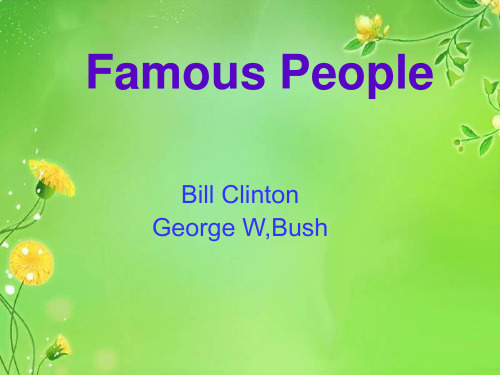
Picture
THE END
Famous People
Bill Clinton George W,Bush
威廉· 杰斐逊· 克林顿
姓名(name): 威廉· 杰斐逊· 克林顿 外文名(English name): William Jefferson Clinton 别名(another name): 比尔· 克林顿 国籍(nationality): 美国 出生地(piace of birth): 美国阿肯色州霍普 出生日期(date of birth): 1946年8月19日(丙戌年) 职业(vacation): 律师,政治家 毕业院校(Graduate school):耶鲁法学院 主要成就(The main achievements): 第42任美国总统两度荣登时代 周刊年度风云人物 • 代表作品(Representative works): 《我的生活》 • 血型(blood group): AB • 身高(height) : 188cm • • • • • • • • •
简介(introduce)
• 威廉· 杰斐逊· 克林顿,美国律师、 政治家,美国民主党成员,曾 任阿肯色州州长和第42任美国 总统。在克林顿的执政下,美 国经历了历史上和平时期持续 时间最长的一次经济发展。在 美国在线于2005年丼办的票选 活动《最伟大的美国人》中, 克林顿被选为美国最伟大的人 物第7位。克林顿兴趣广泛,尤 其爱好音乐,擅长演奏萨克斯 管,曾担任阿肯色州管乐队首 席萨克斯管演奏员。
His family
• 小布什的夫人劳拉曾是一 名图书管理员,他们有一 对双胞胎女儿芭芭拉和詹 纳,1981年出生。小布什 的弟弟: 约翰· 埃利斯· 布 什(John Ellis Bush,又称 杰布· 布什)为佛罗里达州 州长。他的祖父普雷斯科 特· 布什是华尔街一位富有 的金融家,曾是国会(共 和党)参议院议员。其父 亲为美利坚合众国第51届 总统乔治· 赫伯特· 沃克· 布 什。
2人英语的对话范文

2人英语的对话范文大多数我们进行对话的对象只有一个人,如果那个人是你的好朋友,不妨用英语和他交流一下,增加新话题。
下面是店铺给大家整理的2人英语对话,供大家参阅!2人英语对话:比尔克林顿J: Hey,what’s new on the newspaper?J:报纸上有什么新鲜事儿吗?K: Well, here according to Time magazine’s annual list, Lady Gaga, Bill Clinton and Brazil’s leader Luiz Inacio Lula da Silva are the world’s most influential people.K:嗯,美国《时代》杂志年度最具影响力人物排行榜日前揭晓了,Lady Gaga、比尔克林顿和巴西总统路易斯伊纳西奧卢拉达席尔瓦名列各板块之首。
J: Who is Lady Gaga?J: Lady Gaga 是谁?K: You don’t know her?K:你不知道她?J: Nope. I have no idea.J:不知道。
K: You are terribly out! Lady Gaga is an American singer, famous for her bizarre costumes and chart-topping dance music. She is now very hot.K: 你太落伍了! Lady Gaga是位美国歌手,以奋装异服和高居榜首的舞曲而著称。
现在非常火的!J: Then she must be the most influential artist.J:那她一定是"最具影响力艺人”单元的第一名啰。
K:That’s right. Clinton heads the “heroes” section, and the “leaders” list starts with the Brazilian president.K:对。
BillClintonMyLife比尔·克林顿我的生活

BillClintonMyLife比尔·克林顿我的生活Whether I’m a good man is, of course, for God to judge. I have been graced beyond measure4 by my family life with Hillary and Chelsea. No person I know ever had more or better friends, [and] my life in politics was a joy. As for the great book, who knows? It sure is a good story.Born William Jefferson Blythe IV, in Hope, Ark, in 1946, Clinton never knew his father, car salesman Bill Blythe, who died after an auto accident three months before he was born.When Clinton was a toddler5, his mother, Virginia, met the man who would become his stepfather Roger Clinton.Only later would Virginia and her young son discover that Roger, who had a fondness for gambling, was also an alcoholic.Mother and Roger got married in Hot Springs in June, 1950. Not long afterward, I started calling myself Billy Clinton. Roger really loved me and he loved Mother, but he couldn’t ever quite break free of6 alcoholism, childish partying, and the verbal abuse of my Mother.My brother, Roger Cass idy Clinton, was born on July 25, his father’s birthday. I was so happy. Mother and Daddy had been trying to have a baby for some time . I think she, and probably he too, thought it might save their marriage. Instead of making him more responsible, the birth of his only son prompted7 him to drink more.Junior high school brought a whole new set of experiences and challenges, as I began to learn more about my mind, my body, my spirit. Some of what came into my head and life scared the living hell out of m e8, including anger at Daddy, I couldn’t understand why a God whose existence I couldn’t prove would create a world in which so many bad things happened.Because of the way Daddy behaved when he was angry and drunk, I associated anger with being out of control and I was determined not to lose control. Doing so could unleash9 the deeper, constant anger I kept locked away because I didn’t know where it came from. I had real secrets of my own, rooted in Daddy’s alcoholism and abuse. They got worse when I w as fourteen and in the ninth grade and my brother was only four. One night Daddy closed the door to his bedroom, started screaming at Mother, then began to hit her. Little Roger was scared. Finally I couldn’t bear the thought of Mother being hurt and Roger being frightened anymore.I grabbed a golf club out of my bag and threw open their door. Mother was on the floor and Daddy was standing over her, beating on her. I told him to stop and said that if he didn’t, I was going to beat the hell out of him with the golf club. He just caved10, sitting down in a chair next to the bed and hanging his head. Mother said she called the police and had Daddy taken to a jail for the night. I don’t remember that, but I do know we didn’t have any more trouble for a good w hile. I suppose I was sad about it, too. I just couldn’t accept the fact that a basically good person would try to make his own pain go away by hurting someone else.Clinton's interest in politics came at a young age.His involvement in a civic organization called Boys Nation took him to Washington in 1963, where he shook hands with John F.Kennedy at the White House.After graduating from Georgetown University in 1968, and two years in England as a Rhodes Scholar at Oxford, he enrolled at Yale Law School.One day in class, he became intrigued11 by a fellow student.She had a sense of strength and self-possession12 I had rarely seen in anyone, man orwoman. After class I followed her out, intending to introduce myself. When I got a couple of feet from her, I reached out my hand to touch her shoulder, then immediately pulled it back. Somehow I knew that this wasn’t another tap on the shoulder and that I might be starting something I couldn’t stop.One night I was standing at one end of the long, narrow library talking to another student when I saw the girl again, standing at the other end of the room. After a while she closed her book, walked the length of the library, looked me in the eye, and said, “If you’re going to keep staring back, we ought to at least know each other’s names. Mine’s Hillary Rodham. What’s yours?” I was impressed and so stunned I couldn’t say anything for a few seconds. Finally I blurted13 my name out.A couple of days later, I was coming down the steps to the ground floor of the law school when I saw Hillary again. She was wearing a bright flowered skirt that nearly touched the floor. She said she was going to register14 for next term’s classes, so I said I’d go, too. We stood in line and talked. I thought I was doing pretty well until we got to the front of the line. The registrar looked up at me and said, “Bill, what are you doing back here? You registered this morning.” I turned red, and Hillary laughed that big laugh of hers. My cover was blown, so I asked her to take a walk with me to the Yale art gallery to see the Mark Rothko exhibit. It was our first date.在我依旧一个刚从法学院毕业的年轻人时,我买过一些生活指导书,其中有一本是艾伦·拉金写的,名字叫作《如何把握你的时刻和生活》。
Bill-Clinton克林顿英文简介教学提纲
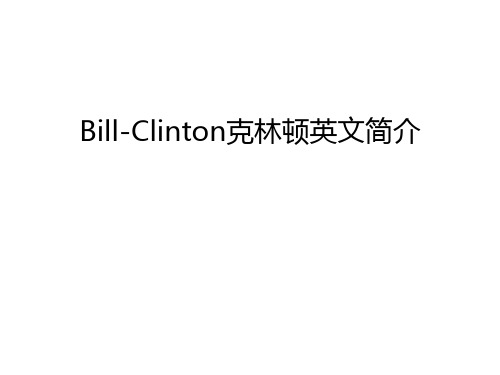
Clinton mainly attended three college schools ❖Georgetown University in Washington ❖University College, Oxford in England ❖Yale Law School in American
Bill-Clinton克林顿英文简介
Student Life
• Elementary school • High school • College school
“ Sometime in my sixteenth year, I decided I wanted to be in public life as an elected official. I loved music and thought I could be very good, but I knew I would never be John Coltrane orStan Getz. I was interested in medicine and thought I could be a fine doctor, but I knew I would never be Michael DeBakey. But I knew I could be great in public service.”
1976. ❖ Elected Governor of Arkansas in 1978.
❖ At the very end of his presidency, Clinton moved to New York and helped his wife win election to the U.S. Senate there.
初三作文:Bill Clinton-比尔·克林顿_800字
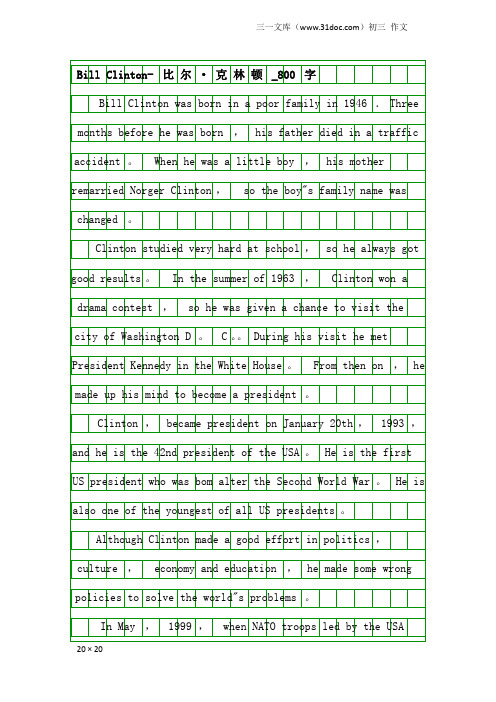
Clinton,became president on January 20th,1993,and he is the 42nd president of the USA。He is the first US president who was bom alter the Second World War。He is also one of the youngest of all US presidents。
Bill Clinton-
Bill Clinton was born in a poor family in 1946.Three months before he was born,his father died in a traffic accident。When he was a little boy,his mother remarried No"s family name was changed。
I hope Bill Clinton will keep his words and be friendly to the Chinese people。
英语课堂五分钟演讲
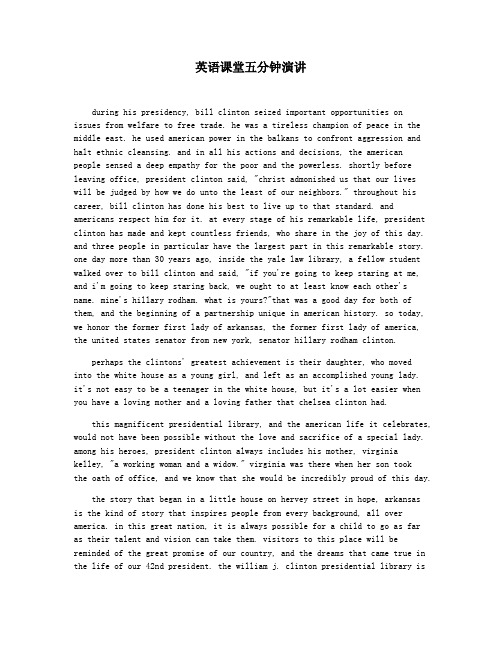
英语课堂五分钟演讲during his presidency, bill clinton seized important opportunities onissues from welfare to free trade. he was a tireless champion of peace in the middle east. he used american power in the balkans to confront aggression and halt ethnic cleansing. and in all his actions and decisions, the american people sensed a deep empathy for the poor and the powerless. shortly before leaving office, president clinton said, "christ admonished us that our liveswill be judged by how we do unto the least of our neighbors." throughout his career, bill clinton has done his best to live up to that standard. and americans respect him for it. at every stage of his remarkable life, president clinton has made and kept countless friends, who share in the joy of this day. and three people in particular have the largest part in this remarkable story. one day more than 30 years ago, inside the yale law library, a fellow student walked over to bill clinton and said, "if you're going to keep staring at me, and i'm going to keep staring back, we ought to at least know each other's name. mine's hillary rodham. what is yours?"that was a good day for both of them, and the beginning of a partnership unique in american history. so today, we honor the former first lady of arkansas, the former first lady of america, the united states senator from new york, senator hillary rodham clinton.perhaps the clintons' greatest achievement is their daughter, who movedinto the white house as a young girl, and left as an accomplished young lady.it's not easy to be a teenager in the white house, but it's a lot easier when you have a loving mother and a loving father that chelsea clinton had.this magnificent presidential library, and the american life it celebrates, would not have been possible without the love and sacrifice of a special lady. among his heroes, president clinton always includes his mother, virginia kelley, "a working woman and a widow." virginia was there when her son tookthe oath of office, and we know that she would be incredibly proud of this day.the story that began in a little house on hervey street in hope, arkansasis the kind of story that inspires people from every background, all over america. in this great nation, it is always possible for a child to go as far as their talent and vision can take them. visitors to this place will be reminded of the great promise of our country, and the dreams that came true in the life of our 42nd president. the william j. clinton presidential library isa gift to the future by a man who always believed in the future. and today, we thank him for loving and serving america.different people have different career outlooks. some people want to become civil servants; some people hope to start their own business; some people dream of being freelancers, and so on.perhaps the clintons' greatest achievement is their daughter, who movedinto the white house as a young girl, and left as an accomplished young lady.it's not easy to be a teenager in the white house, but it's a lot easier when you have a loving mother and a loving father that chelsea clinton had.this magnificent presidential library, and the american life it celebrates, would not have been possible without the love and sacrifice of a special lady. among his heroes, president clinton always includes his mother, virginia kelley, "a working woman and a widow." virginia was there when her son tookthe oath of office, and we know that she would be incredibly proud of this day.however, my ideal job is teaching. firstly, i’m told that teachers have a high income. with the high income, i can open a training school to help the children in poor families with their education. secondly, teachers always have summer and winter holidays, thus i will have more free time to relax myself. more importantly, teachers are angels to students, who can pass on the knowledge to students as well as help them develop their hobbies and interests.i can’t imagine how happy i will feel when i see my students become elites.in order to be a qualified teacher, i should read more books to acquire more knowledge, and train my patience and improve my communication and handwriting abilities.president clinton, senator clinton, president carter and mrs. carter, president bush and mother governor and mrs. huckabee, distinguished guests, ladies and gentlemen: laura and i are really pleased to be a part of thishappy and historic occasion. on this day of dedication, we honor the man from hope, arkansas, who became the 42nd president of the united states. mr. president, congratulations.this presidential library chronicles a vivid era in american history, for the benefit of future generations. it will contribute to the vitality of this fine city and to the great state of arkansas. the collections here record the dedication and hard work of thousands, who brought talent and idealism topublic service. and at the center of that era, at the head of thatadministration, was an able and energetic american. president bill clinton led our country with optimism and a great affection for the american people, and that affection has been returned. he gave all to his job, and the nation gave him two terms.in the early 1990s, the american people saw a young, well-spoken,relatively unknown governor rise to national prominence. yet for decades here in arkansas, the signs of destiny were clear. when young william entered a new school in the 4th grade, a classmate recalls, "he didn't mean to, but he just took the place over." when governor clinton declared his candidacy for president in this city, his close friends were not surprised in the least. they'd always known that bill clinton's moment in history would come.arkansas is a state that knows political skill when you see it. a fellowin saline county was asked by his son why he liked governor clinton so much. he said, son, he'll look you in the eye, he'll shake your hand, he'll hold your baby, he'll pat your dog -- all at the same time.over the years, bill clinton showed himself to be much more than a good politician. his home state elected him governor in the 1970s, the 1980s, and the 1990s, because he was an innovator, a serious student of policy, and a man of great compassion. in the white house, the whole nation witnessed his brilliance and mastery of detail, his persuasive power, and his persistence. the president is not the kind to give up a fight. his staffers were known to say, "if clinton were the titanic, the iceberg would sink."感谢您的阅读,祝您生活愉快。
克林顿西安之行演讲

From this place, trade routes extended through Asia to Europe and Africa. And to this place, great thinkers came, spreading philosophy and new ideas that have contributed to the greatness of China. 贸易之路从这里开始,贯穿亚洲,绵延至欧洲 和非洲。伟大的思想家们也曾来到这里,传播哲 学与新思想,这些都为中国的繁盛做出了贡献。
Let our monument be their judgment that we did that. Let our progress include all people with all their differences moving toward a common aim. Let us give new meaning to the words written in the ancient Book of Rites what you call the Li Ji: “When the great way is followed, all under heaven will be equal.” Xie Xie, Thank you very much. 那就让我们的墓志铭作为我们已经尽力而为的 见证吧。让我们所有人,求同存异,朝着一个共 同的目标前进。让我们给中国古书《礼记》中的 这句名言“大道之行也,天下为公”赋予新的意 义。 谢谢,非常感谢。
Here in this city of your magnificent history we must always remember that we too are ancestors. Someday our children and their children will ask if we did all we could to build just societies and a more peaceful world. 身处这样一个有辉煌历史的城市,我们要始终 牢记我们也是先辈。将来某天,我们的子孙后代 会问我们是否已经竭尽全力建立公正的社会和一 个更加和平的世界。
关于克林顿总统的英语阅读理解

阅读理解。
Bill Clinton took office (就职) on January 20th, 1993 and became the 42nd U.S. president (总统). He is thefirst U.S. president who was born after World War II (第二次世界大战). He is also one of the youngest of allU.S. presidents.Clinton was born in a poor family in 1946. Three months before he was born, his father William Blats died. When he was small, his mother remarried (又嫁给) Norger Clinton, so the boy's family name changed.In the summer of 1963, Clinton won a drama contest (戏剧比赛), so he was given a chance to visit thecity of Washington (华盛顿). During his visit he met President Kennedy in the White House. From that time on,he made up his mind (决心) to become a president.1. How old was Clinton when he became the 42nd U.S. president ?[ ]A. About forty.B. Over fifty.C. Forty-seven.D. Thirty2. Clinton's father, William Blats, died _______.[ ]A. before 1945B. before Clinton was bornC. before World War IID. when Clinton was young3. Why was the boy's family name changed? Because _______.[ ]A. he became a presidentB. his family was poorC. his mother was illD. his mother remarried4. In 1963 Clinton came to the city of Washington _______.[ ]A. to take part in a drama contestB. to have a talk with KennedyC. for a visitD. for his holidays5. This passage is about _______.[ ]A. Bill ClintonB. Norger ClintonC. KennedyD. William Blats答案:1-5: C B D C A。
- 1、下载文档前请自行甄别文档内容的完整性,平台不提供额外的编辑、内容补充、找答案等附加服务。
- 2、"仅部分预览"的文档,不可在线预览部分如存在完整性等问题,可反馈申请退款(可完整预览的文档不适用该条件!)。
- 3、如文档侵犯您的权益,请联系客服反馈,我们会尽快为您处理(人工客服工作时间:9:00-18:30)。
Bill Clinton
Soon after bill came to my rescue with chicken soup and orange juice, we became inseparable .In between cramming for finals and finishing up my first year of concentration on children, we spent long hours driving around in his 1970 burnt-orange Opel station Wagon, or hanging out at the beach house on Long Island Sound near Milford, Connecticut, where he lived with his roommates.
At a party there one night, Bill and I ended up in the kitchen talking about what each of us wanted to do after graduation. I still didn't know where I would live and what I would do because my interests in child advocacy and civil rights didn't dictate a particular path. Bill was absolutely certain: He would go home to Arkansas and run for public office. A lot of my classmates said :they intended to pursue public service, but bill was the only one who you knew for certain would actually do it.
I told Bill about my summer plans to clerk at Treuhaft, Walker and Burnstein, a small law firm in Oakland, California, and he announced that he would like to go to California with me. I was astonished.
I knew he had signed on to work in senator George McGovern's presidential campaign and that the campaign manager, Gary Hart ,had asked Bill to organize the south for McGovern. the prospect of driving from the one southern state to another convincing Democrats both to support McGovern and to oppose Nixon's policy in Vietnam excited him. Although Bill had worked in Arkansas on campaigns for Senator J William Fulbright and others ,and in Connection for Joe Duffey and Joe Lieberman, he'd never had the chance to be in on the ground floor of a presidential campaign.
I tried to let the news sink in .I was thrilled.
"Why," I asked, "do you want to give up the opportunity to do something you love to follow me to California?"
"For someone I love, that's why," he said.
He had decided, he told me, that we were destined for each other, and he didn't want to let me go just after he'd found me.
Bill and I shared a small apartment near a big park not far from the University of California at Berkeley campus where the Free Speech Movement started in 1964.
I spend most of my time working for Mal Bernstein researching, writing legal motions and briefs for a child custody case. Meanwhile, Bill explored Berkeley, Oakland and San Francisco.
On weekends, he took me to the places he had scouted, like a restaurant in north beach or a vintage clothing store on Telegraph Avenue. I tried teaching him tennis, and we both experimented with cooking .I baked him a peach pie, and together we produced a palatable chicken curry for any and all occasions we hosted. Bill spent most of his time reading and then sharing with me his thoughts about books like To the Finland station by Edmund Wilson. During our long walks, he often broke into song, frequently crooning one of his Elvis Presley favorites.
People have said that I knew Bill would be President one day and went around telling anyone who would listen. I don't remember thinking that until years later, but I had one strange encounter at a small restaurant in Berkeley. I was supposed to meet Bill, but I was held up at work and arrived late. There was no sign of him, and I asked the waiter if he had seen a man of his description. A customer sitting nearby spoke up, saying, "He was here for a long time reading, and I started talking to him about books. I don't know his name, but he's going to be President someday." "Oh, Yeah, right," I said, "but do you know where he went?"。
